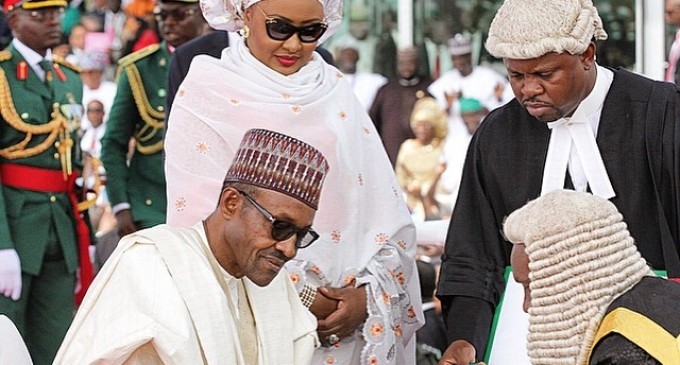
A report by Buharimetre, a civil society monitoring report, tracking the implementation of the president’s campaign promises, has revealed that seven months after taking over government, the Muhammadu Buhari administration has succeeded in achieving only one out of the 222 campaign promises made to Nigerians.
The report covers the activities of the All Progressives Congress-led Federal Government from May 29 to December 31, 2015.
The report, in its assessment, observed that the only achievement was in the area of the fight against corruption, even though a lot was still left undone in that regard.
Advertisement
The 2015 Buharimetre, which is the fourth on the series of report on the assessment, reported, “PMB has only achieved 1 out of the 222 tracked promises, which constitutes 0.5 percent of the promises.
“More so, it reveals that while the government is taking action to achieving only 27 (12.2 percent approximately) of the tracked promises thus ongoing, 194 electoral promises are still ‘Not Rated.’
“The latter constitutes 87.3 percent of the tracked promises.”
The electoral promises not rated, it says, is because there is “no tangible related activities being implemented.”
Advertisement
On the fight against corruption, the report noted that “PMB anti-corruption efforts have been commended as a step in the right direction.
“Positive opinions in this regard are due to the possible positive impact of the efforts on development and democracy in the country.
“However, the government has been accused of politics of selection in the fight against corruption. A delay in the prosecution of the accused people has been a major criticism of the government. Moreover, while the government has shown unmatched commitment to curbing corruption, such effort should be institutionalised.
“The campaign against corrupt practices should simultaneously exist with interventions such as social provisions that could discourage people from engaging in corrupt practices, and to a large extent, galvanize support for the campaign. This may also help institutionalise the anti-corruption process in the country.
“Allegations of perceived bias continue to be made against the PMB administration in several parts of the country. For instance, the South Eastern part of the country continues to claim marginalization on the part of the government.”
Advertisement
On security, the report said “Members of the group (Boko Haram), who formerly travelled in armoured personnel carriers (APCs), now ride horses, motor bikes and bicycles to carry out their nefarious activities.
“These range from poisoning water when fleeing villages and adopting soft target attacks using suicide bombing, executed mostly by young girls.
“The insurgents have also carried out attacks in Nyanya and Kuje, on the outskirts of the capital city, Abuja.”
The report faulted the government’s responses to the increasing number of internally displaced persons whose living conditions had become life threatening.
“This may be partly because the problem is not Boko Haram alone. Amnesty International recently issued a report titled Stars on Their Shoulders, Blood on Their Hands indicting the Nigerian military for its wanton killings in the war against the insurgency,” it said.
“The ICC-OTP has also established eight possible cases of crimes against humanity in relation to the North East of Nigeria. This includes six possible cases against Boko Haram and two possible cases against the Nigerian security forces.”
Advertisement
The report also drew attention to the fact that the remote and immediate causes of violent extremism are still very much alive in the polity.
“There are smaller, less popular Islamic radical groups present in several parts of Northern Nigeria,” says the report.
“For instance, Yanlabaiku in Kebbi state is preaching against Western education and Westernisation, and Niger state is pervaded by different radical Islamist groups. Most of these groups live in seclusion, preaching and practicing radical Islam.”
On the Biafra struggle, the report noted that the state approach, and particularly the security sector approach in handling the conflicts remained a cause for concern across the country.
“There are fears that if the IPOB is not properly managed, it may degenerate into a low level insurgency, further compounding current security challenges,” it said.
“Soon after the security agents clampdown on the Biafra separatist movement, there were reports that the Nigerian Army, in preventing an alleged attempted assassination on the Chief of Army staff, General Buratai, killed twenty Shia members in Zaria.
“The Shia are said to have put up barricades and blocked the road to be used by General Buratai. The Army went to the sect’s enclave Husainiyyah, the residence of sect leader Ibrahim Zakzaky in Gyallesu, and the DarurRahma mosque, where many unarmed people were killed.
“Human Rights Watch (HRW), has alleged that no fewer than 300 members of the Shia sect were killed and secretly buried by members of the Nigerian army,” the report stated.


